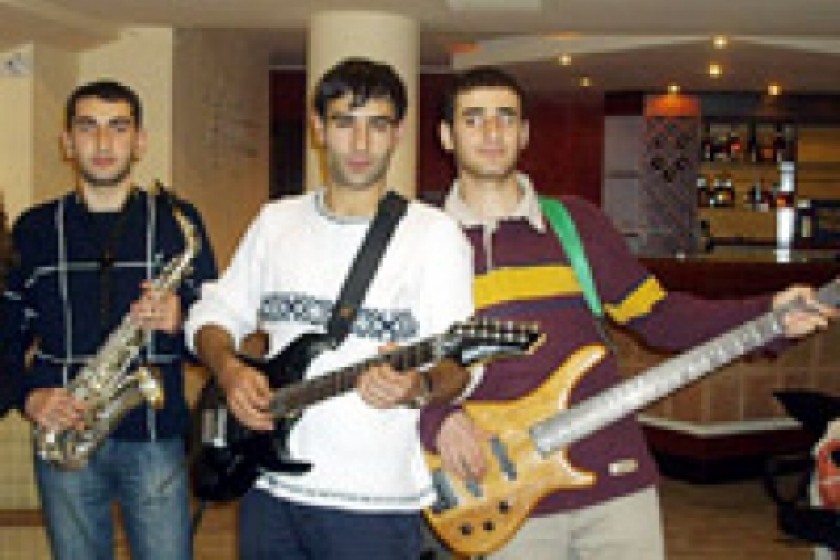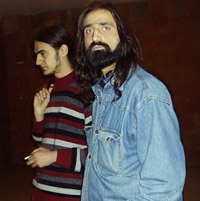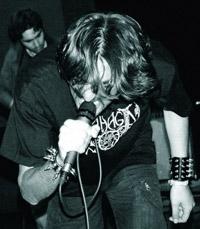
The Three Extremes of Armenian Rock Music
“Some of the guys from my college class gave me a guitar for my birthday and things just took off.” This is how Narek, a 4th year student at
One day Narek met Zakar at the Student Council where he’d often hang out. Zakar, who would always be in a state of confusion, coming and going aimlessly, took Narek on as a bass player in his group. It all started for Narek about three years back as well when they played a gig at the
Synkope is a medical term that means ‘a pause of the heart’. The guys in the group recount that they’ve played under a variety of names before coming up with this appellation. Once, they had to change the band’s name five minutes before going on stage when they found out that another group with the same name already existed. “ They’d ask me what type of music do we play and I’d tell them, a mixed bag of stuff. When asked what instruments we play, I’d give the same answer, a mix of instruments. It was the same with the group’s line-up, a mix of guys and girls. That’s how we formed this mixed group “ relates Zakar.
Today, there are solo, bass and acoustic guitars, keyboards, flute and percussion in this “mixed” band at the
The band describes their music as a fusion of mountain, classical, metal, jazz and rock; but they never give the matter much thought. They play what they feel and experience.
Vagner, the group’s guitarist, says that, “ Our playing still hasn’t reached a professional level so sometimes we can’t convey what we’d like to, but we’re working on it. We’re slowly on the way up especially since the addition of Anna (a graduate of the
Members of the group have teamed up with another band from the
It’s been a month that
“ The song Mayramut (Sunset) for example, is heavy rock. I’ll pen a song that’s classified as the blues but which is more akin to jazz, but it’s not really jazz per say. We’re a mixed bag, man...” Narek states as he tries to nail down the group’s musical style.
Zakar adds that whatever the band plays it has always been rock-influenced and that they all started out listening to rock music.
“ We don’t cater to the “kebab crowd” declares Vagner and adds that he plays for his college classmates. The group has a good student audience because they play live and in Armenian and because their music hits home with the college kids.
As to how they see their future in the band and whether they’d like to make some real money as musicians, Narek confesses that for him the band is a bit more than just a serious hobby. Zakar doesn’t rule out anything either except for playing on street corners for chump change. They consider themselves to be “medical musicians”.
“ As a youngster I had stomach problems and my uncle the pediatrician always prescribed enema treatments for me. I vowed that when I grew up I’d give him some enemas in return. And then I became a doctor. In a way my uncle served as a source of inspiration for me “ says Vagner who goes on to confess that he still hasn’t fulfilled that vow and that he has much to do in his capacity as a physician.
Rock That’s Impossible to Play Without Sheet Music
 “The people who listen to us are those who don’t consider rock to be just a couple of bass guitars wailing away.” That’s how Jeff (Vahagn Papayan), who along with some friends founded the band Oxsenhem in 2001, sees things. Jeff describes the ban’s music as progressive rock. Koryun, the group’s guitarist, says that the band’s music is always developing and exploring new directions and in a state of flux.
“The people who listen to us are those who don’t consider rock to be just a couple of bass guitars wailing away.” That’s how Jeff (Vahagn Papayan), who along with some friends founded the band Oxsenhem in 2001, sees things. Jeff describes the ban’s music as progressive rock. Koryun, the group’s guitarist, says that the band’s music is always developing and exploring new directions and in a state of flux.
When Oxsenhem was formed many of its members were already playing in other Armenian rock bands. Oxsenhem’s musical palette took on another shading. The band mostly performs complex but melodic music accompanied by the sounds of violin and flute. Vocalists invited from other groups perform on some of the songs as well. Jeff and now Vardan, the group’s newest and youngest member who plays a variety of keyboard instruments, write all the music.
“ The former piano player got pregnant and left the band but we had nothing to do with that, “ jokes Jeff. Vardan says that he read an advert the band had published and showed up to play.
They joke that Vardan is the most forgetful member of the band and that he’s always loosing something or other. As a result, they’re all in a frazzle right before a concert. Vardan confesses that, “ I’m often misplacing my sheet music and while it’s possible to play by memory it’s certainly difficult and we almost never improvise.”
When asked if they earn a living playing rock music all the members respond that. “ Yes, rock music is our life.” It’s true that all the guys play in other bands as well. Jeff, for example, is employed as a sound engineer.
Vahagn believes that, “ You have to excel at your work in order to make money instead of whining all the time. Otherwise you’ll wind up having neither instruments nor the time and place to practice.” Koryun interjects that a time will come when all the garbage that now passes as music on the T.V. will be swept away and that not every “manifestation will be included under the rubric of music”.
Vardan thinks that rock will eventually be accepted as a musical genre and that’s why the ban’s motto is “it’s all about the music”. As to the conceptualization of the band’s name the guys declare that the word Oxsenhem came to them from ‘on high’. The group has already cut a CD with the same heavenly name and it’s on sale the world over, but not in
Armenian Pagan Black Metal That’s About the Genocide
 With a sound being the synthesis of ten musical instruments Aramazd cuts a unique figure in the Armenian reality of today. What results is a personification of spirit particular to Aramazd himself. As he puts it the idea came totally out of the blue but it’s all based on a love of metal.
With a sound being the synthesis of ten musical instruments Aramazd cuts a unique figure in the Armenian reality of today. What results is a personification of spirit particular to Aramazd himself. As he puts it the idea came totally out of the blue but it’s all based on a love of metal.
“In 1999 my friend Armen, who now lives in
“My friend left and I continued on with the songs “Kochari” and “Hovern Yegan” for which I meticulously downloaded the parts for the bass and national musical instruments, “ says Aramazd. He adds that he adopted the name of the supreme god in the Armenian mythological pantheon when his songs first appeared on the Internet.
Aramazd observes that back in 1999 the realm of metal rock in
“The underlying rationale of Aramazd is to convey, through music, the totality of moral concepts and conception of the universe that Armenians of old adhered to. It’s not a call to battle but rather a call to be alert if war comes. There’s nothing remotely fascistic about it “ says Aramazd and adds that pagan black metal serves as his stylistic underpinnings.
Today Aramazd is quite popular with those who listen to heavy rock and they can listen to this music through the Internet and over the radio.
“I’d like to be better known but I’ve never thought about going commercial,” states Aramazd. He’s working on a CD to come out soon most likely to be called “Ar” which means - the beginning of everything. But he doesn’t expect that heavy metal music will bring in big bucks in
He’s preparing the CD with the use of the latest in computerized technology. “ For example there’s a subtle but noticeable difference in the live and computerized versions of “zurna” playing which can be minimized through precise fine tuning.”
In addition to this project Aramazd also hosts a Sunday radio program from 10 to 3 in the morning dedicated to this type of music. He plays his own recordings and songs from other Armenian metal bands and publicizes their work.
“My radio audience is so tiny that I probably know them all on a first-name basis. They’re the same Armenians who are followers of rock in general. According to Aramazd, many know recognize him as the DJ of the “Metal Front” radio program.
Most of his listeners probably don’t know that Aramazd, who is a specialist in calculating equipment, doesn’t consider himself a musician nor does he pretend to be one. When it comes to opining on the rock scene in
“It’s always the same people who listen to rock, the same bands and the same old songs; the words to which they already know by heart. You can’t go on listening to the same stuff forever, can you?” Aramazd notes with a degree of cynicism. He adds however that despite all this there’s movement in the world of rock, periodic festivals and concerts are staged, which, in his view, can’t be a bad thing.
Shushan Harutyunyan
 Videos
Videos Photos
Photos
Write a comment